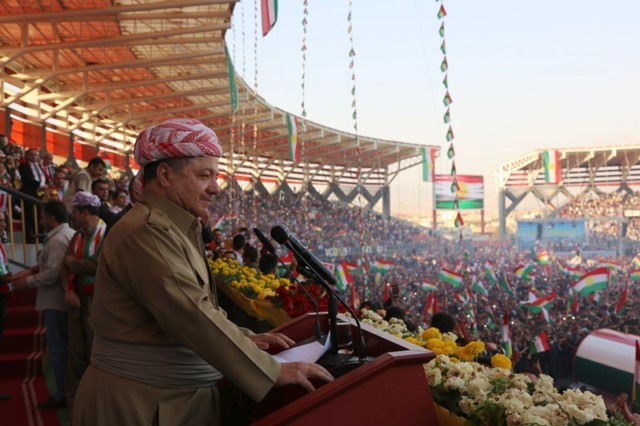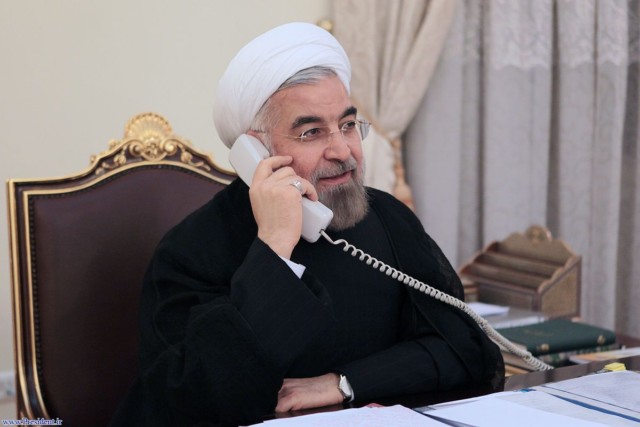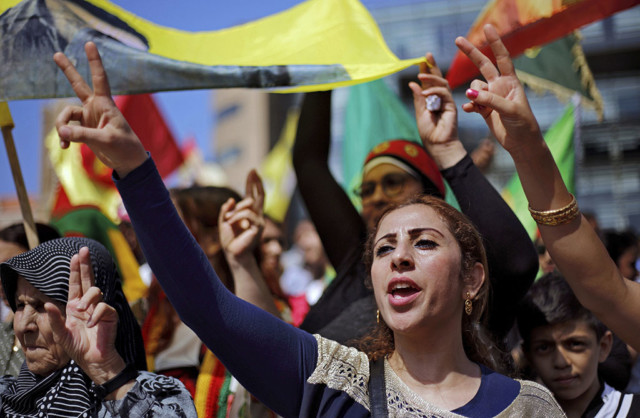The choice at the ballot box will be simple: should the Kurdish region split from Iraq in order to form a separate nation, Kurdistan?
It’s a simple question but the outcome of Monday’s independence vote could have far-reaching implications.
CGTN’s Tony Cheng explains what’s at stake.
For hundreds of years, the ethnic Kurds have dreamed of a homeland. Now, for those who live in Iraq, this may be their best chance. Their champion, President Masoud Barzani called for the referendum to determine if they should secede from Iraq.

President Masoud Barzani attends a large pro-referendum rally in Erbil ahead of Monday’s vote on Kurdistan independence referendum. (Krp.org)
The Kurds are likely to approve the referendum, but the non-binding vote is not expected to result in any formal declaration of independence. The vote, which is due to go ahead on Monday, has stirred passions in the semi-autonomous region which has long had a troubled relationship with Iraq’s central government. They rift centers around the sharing of oil revenues and the fate of disputed territories like the city of Kirkuk.
President Barzani in front of 200000 people in Erbil: It is too late,referendum is at the hands of this people, on 25/9 we will all Vote YES pic.twitter.com/0803PLWYFF
— Dr. Hemn Hawrami (@heminhawrami) September 22, 2017
But the Kurds are surrounded by opposition. Turkey, Iran and Iraq have all expressed disapproval.
The referendum is unconstitutional, threatens Iraq & peaceful coexistence amongst Iraqis and is a danger to the region
— Haider Al-Abadi حيدر العبادي (@HaiderAlAbadi) September 24, 2017
رئيس مجلس الوزراء القائد العام للقوات المسلحة الدكتور حيدر العبادي يترأس اجتماعا للمجلس الوزاري للامن الوطنيhttps://t.co/tWJIkqsEuV pic.twitter.com/WkI8xb9wkV
— Haider Al-Abadi حيدر العبادي (@HaiderAlAbadi) September 24, 2017
In a sign of Tehran’s concerns over the vote, Iran’s powerful Revolutionary Guard launched a military exercise in its northwestern Kurdish region. Iran also took steps to block its airspace to all flights to-and-from Iraq’s Kurdish Region. The flight suspensions were reportedly enacted at the request of Baghdad.

Iranian President Hassan Rouhani and Turkish President Recep Tayyip Erdogan discuss the latest developments surrounding Monday’s referendum vote on independence of the semi-autonomous Kurdish region in Iraq.
In a rare moment of agreement, Saudi Arabia has come out on the same side as its arch regional rival, Iran. It has publicly called for the vote not to move forward, citing current regional conditions and the potential for the vote to ignite a new crisis. The United Sates and the United Nations have also condemned the referendum.
Kurds, Turkmen and Arabs living in the disputed city of Kirkuk have mixed opinions regarding Monday’s vote by Iraq’s Kurds on support for independence. The forthcoming referendum has stirred fears of instability across the region as the war against the Islamic State group winds down.
I call on Kurdistanis to vote for independence to determine terms of our future. Tomorrow symbolises our nation's generational struggle- mb.
— Masrour Barzani (@masrourbarzani) September 24, 2017
Initial results from the vote are expected on Tuesday, with the official results announced later in the week.
 CGTN America
CGTN America
 Supporters of the Kurdistan Workers’ Party, known as the PKK, chant slogans as they flash victory signs during a demonstration demanding the release of Kurdish guerrilla leader Abdullah Ocalan, in front of the United Nations Headquarters in Beirut, Lebanon, Sunday, Sept. 24, 2017. Ocalan, the founder of the PKK, was captured in Kenya after being forced to leave a Greek diplomatic mission there in 1999, and was sentenced to death for leading an insurgency fighting for Kurdish autonomy in Turkey’s southeast that has claimed tens of thousands of lives since 1984. (AP Photo/Bilal Hussein)
Supporters of the Kurdistan Workers’ Party, known as the PKK, chant slogans as they flash victory signs during a demonstration demanding the release of Kurdish guerrilla leader Abdullah Ocalan, in front of the United Nations Headquarters in Beirut, Lebanon, Sunday, Sept. 24, 2017. Ocalan, the founder of the PKK, was captured in Kenya after being forced to leave a Greek diplomatic mission there in 1999, and was sentenced to death for leading an insurgency fighting for Kurdish autonomy in Turkey’s southeast that has claimed tens of thousands of lives since 1984. (AP Photo/Bilal Hussein)
